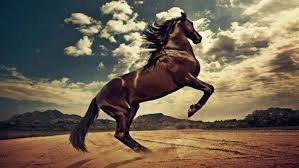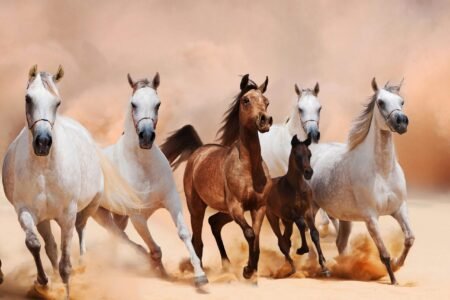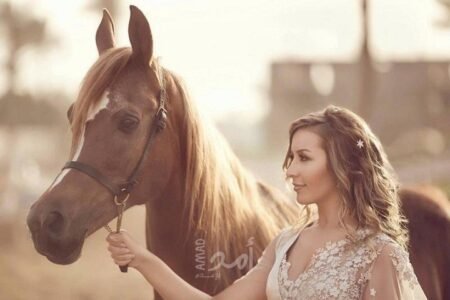God preferred horses over the rest of the animals subjected to us, as God Almighty swore by them in a Surah in its name, which is “Al-Adiyat” by saying: .
“Horses that run on their stirrups when needed, whose voices are loud when running.”
Imam al-Tabari says in his commentary that Surat al-Adiyat is Meccan, in which God Almighty swears by horses if they are run in His way, and they are returned and sacrificed, and it is: the sound that is heard from the horse when they run.

Ibn Abi Hatim said: Abu Saeed Al-Ashjj told us, Abdah told us, on the authority of Al-Amash, on the authority of Ibrahim, on the authority of Abdullah: “And the regular ones are morning”: camels.
Ali said: They are camels. Ibn Abbas said: It is the horse. Then Ali heard what Ibn Abbas said, and he said: We had no horses on the day of Badr. Ibn Abbas said: It was in a company that was sent.
Ibn Abi Hatim and Ibn Jarir said: Yunus told us, Ibn Wahb told us, Abu Sakhr told me, on the authority of Abu Muawiyah al-Bajali, on the authority of Saeed bin Jubayr, on the authority of Ibn Abbas, on the authority of Ibn Abbas, he said: While I was sitting in the stone, a man came to me and asked me about: I said to him: When the horses change in the way of God, then they take refuge at night, so they make their own food and burn their fire. So he turned away from me, so he went to Ali, may God be pleased with him, while he was watering Zamzam, so he asked him about (and the regular ones) and he said: Did you ask anyone before me about it? He said: Yes, I asked Ibn Abbas, and he said: Horses change for the sake of God. He said: Go and call him to me. When he stood on his head, he said: People give fatwas about what you have no knowledge of, and by God, if the first expedition into Islam was Badr, and we had only horsemen with us: a horse for al-Zubayr and a horse for al-Miqdad, then how can the ordinary ones become a sacrifice? But Al-Adiyat Al-Fajr from Arafat to Muzdalifah, and from Muzdalifah to Mina.
Ibn Abbas said: So I retracted what I said, and went back to what Ali, may God be pleased with him, had said.
With this chain of narrators on the authority of Ibn Abbas, he said: Ali said: (And the ordinary ones are at dawn) from Arafat to Muzdalifah, and if they come to Muzdalifah, they light the fires.
Al-Awfi said, on the authority of Ibn Abbas: It is the horse.
And he said, according to Ali: It is a group of camels. Among them: Ibrahim and Ubaid bin Omair, and according to the words of Ibn Abbas, others, among them: Mujahid, Ikrimah, Ataa, Qatadah, and Al-Dahhak. It was chosen by Ibn Jarir.
Ibn Abbas and Ata’ said: No animal was ever sacrificed except for a horse or a dog.
Ibn Jurayj said, on the authority of Ata’: I heard Ibn Abbas describing the dawn: Ahh.
Valmoriat mug
It means Asttakk Soleha of the rock Vkth him fire.
And most of them said in his saying: (The maurites are a cup) meaning: with their hooves. And it was said: They will wage war between their riders. Qatada said.
And on the authority of Ibn Abbas and Mujahid: “The mortals are a cup,” meaning: the deception of men.
It was said: It is the kindling of fire when they return to their homes at night.
It was said: What is meant by that is the fires of the tribes.
And whoever interpreted it as horses said: It is the kindling of fire in Muzdalifah.
Ibn Jarir said: The first correctness is that it is horses that flail their hooves.
The changes are in the morning
I mean, the raid is in the morning, as the Messenger of God, may God bless him and grant him peace, used to change in the morning and listen to the call to prayer. If he heard an adhan, otherwise he was jealous.
And his saying (The changers are in the morning) Ibn Abbas, Mujahid and Qatadah said: It means horses raiding in the morning in the way of God.
And the one who interpreted it as camels said: It is the morning drive from Muzdalifah to Mina.
So they made him soak
It means dust in the horses’ camp. And they all said in his saying: (So they caused it to soak) it is: the place where, if you get into it, you raise dust, either during a pilgrimage or an expedition.
And they abode with him all together.
Any mediate that place all gathered.








